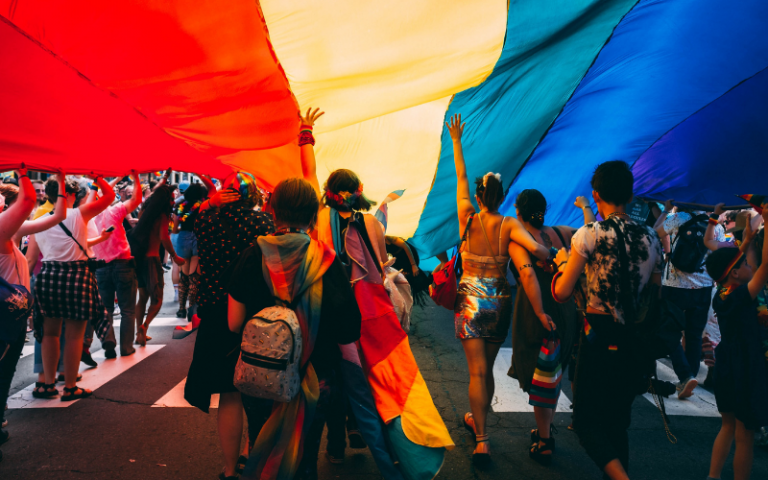Wellbeing and self-care during Pride month
15 June 2021
June is Pride month, and it's a time to celebrate and reflect for the LGBTQ+ community. It's important to look after your wellbeing through self-care and support from UCL and other organisations, as UCL student Anjali writes below.

It’s Pride month! A time to celebrate the LGBTQ+ community. During this time, it’s important to talk about vital self-care steps and practices to develop for your mental health and wellbeing as an LGBTQ+ person, particularly when LGBTQ+ individuals can experience a variety of mental health struggles.
In my experience, realising and accepting my bisexuality has been a turbulent process. I began to question myself in 2018, and like many queer individuals, it took me a long while before this reflection went from a subconscious awareness to a conscious struggle.
Like many LGBTQ+ individuals, once I realised that the label of ‘bisexual’ felt comfortable to me, I wanted to freely express myself to my family and friends. However, when faced with family members who weren’t accepting and friends who didn’t quite understand the struggle, I felt alienated.
Simultaneously, I was constantly second guessing myself, having moments of crisis every month feeling that I was “faking it”. However, in the past few years, I have become reassured that such feelings are only born out of compulsory heterosexuality and heteronormativity. I have been able to learn more about the nuances of issues faced by LGBTQ+ individuals, of which mental health and wellbeing is particularly important.
Below are some specific ways in which to take care of your mental wellbeing this Pride month.
Coming out and safety first
Celebrating your identity, especially during pride month, can feel like a necessary practice to being “successfully” LGBTQ+. However, the expression of oneself is incredibly personal and subjective. While the desire to openly express yourself and be ‘true’ to yourself can feel deeply urgent, keeping your identity hidden from some, or from all, is completely valid and sometimes necessary.
Never feel that you aren’t being true to yourself if the important people in your life don’t know your identity. As important as being LGBTQ+ may be to you, there should be no pressure on you to be open with it.
This is particularly important if your personal safety and wellbeing could be threatened by coming out. Remember that you will undoubtedly reach a point in your life where you can be completely open, but financial and physical dependency on others can be a great hindrance to this. Living with family who aren’t accepting or who refuse to give you space can be burdensome and taking steps to censor your LGBTQ+ identity and/or distance yourself from these people is important and valid. In the future, you will have the means to support yourself and be more comfortable in your LGBTQ+ identity.
Mental health resources for LGBTQ+ individuals are available at the end of this article.
LGBTQ+ safe spaces
After realising that you are LGBTQ+, seeking a safe space to talk about your experience and meet like-minded people can be very helpful. However, contradictory discourses and beliefs in the community can lead to exclusion and discrimination within such safe spaces.
It can feel like you must participate in any LGBTQ+ specific space you come across, but always remember to put yourself and your comfort first if you are made to feel insecure or doubtful. You will always have the opportunity to meet people that make you feel valid and don’t expect anything from you.
Unlearning and learning LGBTQ+ self-care
Years' worth of internalised biases, heteronormative standards, restrictive gender binary standards, and compulsory sexuality which restricts those on the asexual spectrum: it can all lead to an unhealthy perception of your LGBTQ+ self. It’s vital to take time to reflect and identify thought patterns and processes which may subconsciously take place in your mind, but don’t align with your values and knowledge as an LGBTQ+ individual. This can allow you to gain new perspectives and deeper levels of self-acceptance and understanding, helping you and those around you.
LGBTQ+ People of Colour: alienation
For those who experience exclusion and alienation due to their race or ethnicity, LGBTQ+ discrimination adds a layer of inner conflict and mental turmoil. Many LGBTQ+ specific spaces can dismiss queer people of colour and the role they play in LGBTQ+ history, as well as overshadowing LGBTQ+ narratives which come from people of colour.
If you are an LGBTQ+ person of colour feeling unable to voice your thoughts and experiences of LGBTQ+ struggle because of this, don’t feel guilty about seeking POC safe spaces. While we often feel obligated to try to belong to any LGBTQ+ social group we find because they feel so rare, don’t settle for a negative environment: continue to seek safe and supportive spaces.
Resources and organisations for support
LGBTQ+ Mental Health & Wellbeing Support Services and Hotlines
LGBTQ+ Resources for Education and Understanding
- The It Gets Better Project
- Stonewall
- LGBT Health and Wellbeing
- AZ Magazine
- BAME LGBT Charity
- Blackout UK
- Bi’s of Colour
- Queer Asia
Happy Pride Month!
 Close
Close

